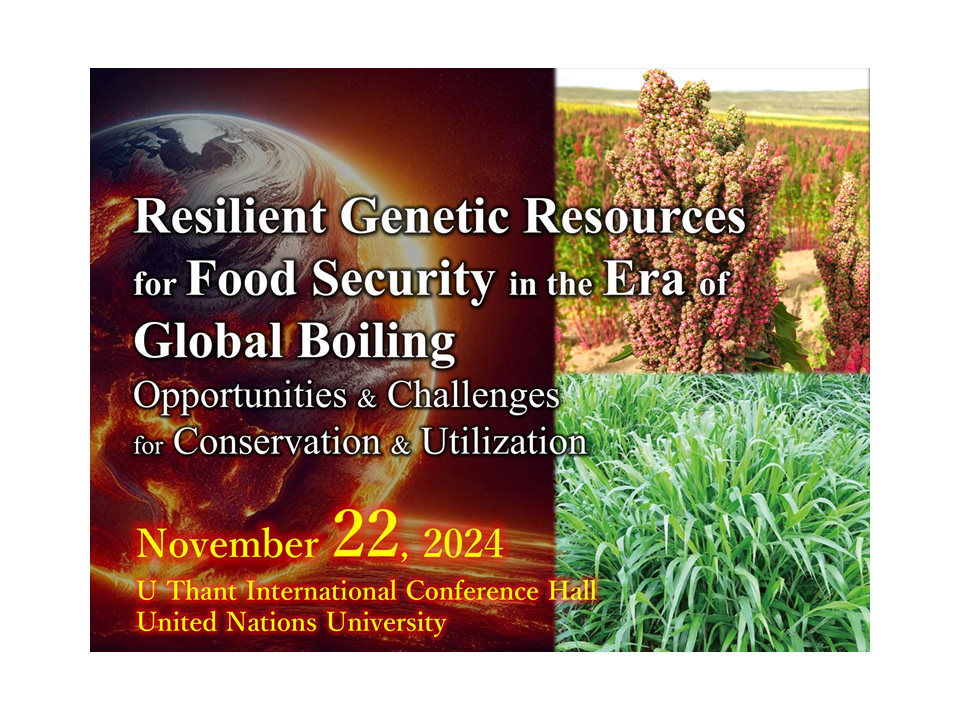Pick Up
1131. JIRCAS International Symposium 2024

1131. JIRCAS International Symposium 2024
In July 2023, as humanity experienced record-breaking global average temperatures, UN Secretary General António Guterres declared the end of the global warming era and the beginning of the global boiling era. The recently published IPCC AR6 reports have predicted that the world will experience extreme events, including heat waves and flash floods, with increasing frequency and severity as anthropogenic climate change escalates. Agricultural sectors, which already bear a significant burden with about 25% of climate-related loss and damage, would be particularly affected by such extreme climate events. The impact will be disproportionally felt by smallholder farmers in the Global South, while changing weather patterns could threaten global food security by disrupting growing seasons in key mid-latitude breadbasket regions. Undertaking the improvement of resilience of genetic resources is urgent to ensure food security in the face of these challenges.
In retrospective, since the beginning of agriculture some 12,000 years ago, humans have selectively bred and domesticated thousands of genetic resources for food. As plants cannot move from one place to another, they have developed phenological and stress resilience mechanisms to thrive in locally specific environments. Modern breeding practices, in turn, have favored the selection of high-yielding varieties with traits that enhance responsiveness to external inputs such as chemical fertilizers and pesticides, as well as adaptability to a wide range of environmental conditions. While this approach has facilitated the mass production of modern varieties, often grown under monoculture conditions, and provided cheap calories, it has also led to a reduction in genetic diversity with traits such as high nutrition values and stress tolerance. Consequently, modern food systems have become increasingly vulnerable to emerging biotic and abiotic stresses, driving a vicious cycle of increasing dependence on external inputs to maintain productivity.
In order to build resilient food systems in the era of global boiling, we need to conserve and restore the diversity of nutritiously rich genetic resources and harness their inherent resilience to biotic and abiotic stresses. One such opportunity may lie in the utilization of climate-resilient food crops, including neglected and underutilized species (NUS) which are often highly nutritious. Accelerating the application of genetic diversity in crop breeding requires not only the conservation and use of genetic resources, but also a firm commitment by all parties and stakeholders to adhere to the principles of Access and Benefit Sharing (ABS).
The Japan International Research Center for Agricultural Sciences (JIRCAS) has been engaged in research to develop crops resilient to various environmental shocks and stresses, with special focus on rice and soybeans as major crops and quinoa as an orphan crop, and in efforts to disseminate a shared resource of information, technology and materials of tropical crop genetic resources through international and national collaboration and networks. This Symposium aims to bring together stakeholders from research, policy, administrative, and business sectors to identify and discuss opportunities and challenges in institutionalizing the conservation and utilization of resilient genetic resources for ensuring food security amidst the challenges of the global boiling era.
JIRCAS International Symposium 2024 : Resilient Genetic Resources for Food Security in the Era of Global Boiling – Opportunities and Challenges for Conservation and Utilization
Date: 2024-11-22(Fri) 13:30~17:30 (13:00 Admission)(JST)
Place: U Thant International Conference Hall + Online (United Nations University 3F, 5-53-70 Jingu-mae, Shibuya-ku, Tokyo 150-8925)
Registration Site: https://www.jircas.go.jp/ja/symposium/2024/e20241122_jircas
Contributed by: JIRCAS International Symposium 2024 Secretariat
